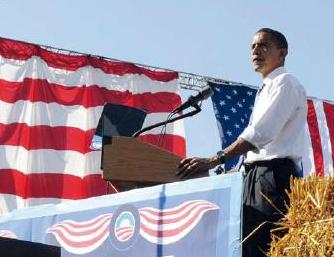Obama: Farm Bill under a new administration

New US President Barack Obama has moved into the White House. How will his administration manage the US agricultural system? Industry experts and politicians share their opinion.
By Nicholas Zeman, USA
President George W. Bush initially vetoed the 2008 US Farm Bill, and Washington insiders say he was hostile to it at every turn. “It was a highly ideological and rigid approach to negotiating with Congress,” says Earl Pomeroy (Democrats), who is in the House of Representatives on behalf of the state of North Dakota. He was very involved in the process of authorising the monstrous $300 billion piece of legislation. “He walked away from the opportunity to be involved; it was irresponsible, ideological nonsense.”
Bush’s approach was much more related to an ideology of imposing caps for public farm funding, meant to decentralise market share and curb government support of vertically integrated firms. In 2007, the Bush administration had announced a proposal to disqualify producers with a net income above $250,000 from receiving government subsidies.
The Farm Bill sent by Congress to the President’s office, however, contained benefits for farms with purses much heavier than the weight suggested by the administration. Unlike Bush, President Barack Obama supported the Farm Bill and voted for it, even though he agreed with the administration that farm incomes should be capped to benefit smaller players and new entrants.
It was a compromise Pomeroy says demonstrates Obama’s understanding of the complex and subtle details involved with passing federal legislation. “I’m for payment limits too, but that issue has to be dealt with largely at the regional or state level,” Pomeroy says. “Because of the consolidated nature of farming and the many interests the Farm Bill considers, compromises had to be made for the purpose of consensus. President Obama supported the Farm Bill because he understands compromise.”
Obama and agricultural trade
While many agricultural issues floated behind the scenes during the campaign season, markets certainly took centre stage. In September 2008, the failure of Lehman Brothers investment bank signalled a brutal Wall Street and a global economic slowdown. Greed, market manipulation and excessive speculation were blamed. The way that agriculture could be most affected by responsive efforts to the economic recession is through tighter government controls on commodity futures markets. Pomeroy says there will be an evaluation of financial regulations across the board, including the positions hedge funds and other non-commercial speculators. “This will be an area of increased scrutiny and legislative activity,” he says. “We closed the Enron Loophole and we closed the London Loophole in this last Farm Bill, so we are not going to hammer the concept of liquidity in commodity markets.”
Imposing tighter regulations in the financial sector keeps with the tendencies and tenets of the Democratic Party philosophy, as does increase scepticism in trade deals. This could worry the livestock industry. Tapper says that he hopes Obama will be as aggressive in negotiating trade deals as Bush, whose work with Korea and Brazil especially has won the praise of an industry now exporting about 20% of its product. “Obama has always voted against trade,” says Daniel Sumner, Director of the Agricultural Issues Centre at the University of California-Davis. “He has never found a real trade agreement he could support and campaigned against Nafta (North American Free Trade Agreement).”
Obama has said that he supports the swift implementation of the Country of Origin Labelling (COOL) programme, which was made legal with the passage of the Farm Bill. “Every statement and vote he has ever taken has been protectionist,” Sumner tells. “He may change now that he is President, but there is no evidence that this will happen.”
History shows that protectionist moves can often have disastrous affects, like the anti-trade Smooth Holley Bill, passed in 1929 and said to have brought about the Great Depression. “We’re not going to see any reactionary anti-trade legislation,” Pomeroy says. “There will be a rigorous evaluation of trade agreements on the basis of clear benefits for the US. I certainly don’t think we will see any more of a free trade at any cost philosophy. President Obama will not operate on the assumption that new trade is good trade no matter what. There will be a healthy scepticism as deals are put together.” So basically, in the end there can only be speculation about the policies of a new President, but there probably will not be major changes to American farm policy for the first term of the Obama administration anyway.
“It’s a 5-year bill so there’s not much likelihood that it would be opened before 2013,” Pomeroy says. “Right now there are bigger fish to fry.”
World Poultry Vol. 25 No. 2













